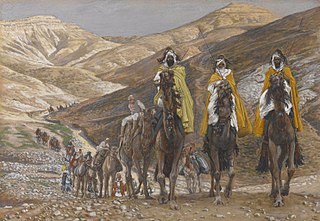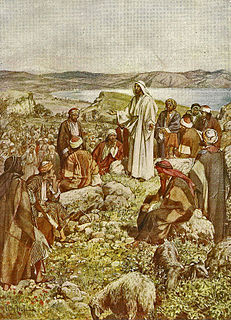Related Research Articles

Matthew 2:1 is the first verse of the second chapter of the Gospel of Matthew in the New Testament. The previous verse ends with Jesus being named by his father. This verse marks the clear start of a new narrative, although the use of a quotation from Isaiah 7:14 in Matthew 1:23 is also reflected in the use of four Old Testament quotations in chapter 2.

Matthew 2:11 is the eleventh verse of the second chapter of the Gospel of Matthew in the New Testament. The magi, dispatched by King Herod, have found the infant Jesus and in this verse present him with gifts in an event known as the Visit of the Wise Men. In art, it is traditionally referred to as the Adoration of the Magi.

Matthew 3:9 is the ninth verse of the third chapter of the Gospel of Matthew in the New Testament. The verse describes an incident where John the Baptist berates the Pharisees and Sadducees. He has previously called them a brood of vipers and warned them of the wrath to come and has urged them to repent. In this verse he warns that their links to Abraham will not save them.

Matthew 3:11 is the eleventh verse of the third chapter of the Gospel of Matthew in the New Testament. The verse occurs in the section relating the preachings of John the Baptist. In this verse he predicts that he will be followed by someone much greater than himself. The main theme of this verse is that John will soon be supplanted by a much greater figure and that John's water baptism is just a preparation for the much greater baptism by fire and spirit that will occur under the second coming of the Christian messiah Jesus, an original Christian concept that, according to Jewish scholars, lacks any fundament in the Hebrew scripture.

Matthew 4:24 is the twenty-fourth verse of the fourth chapter of the Gospel of Matthew in the New Testament. This verse is part of a brief summary of and introduction to Jesus' ministry in Galilee, which will be recounted in the next several chapters. This verse relates Jesus' fame "throughout all Syria" and summarizes his work of healing.

Matthew 5:20 is the twentieth verse of the fifth chapter of the Gospel of Matthew in the New Testament and is part of the Sermon on the Mount. Jesus has reported that he came not to destroy the law, but fulfill it. But in this verse, he makes clear that the common understanding of the Law is not enough.

Matthew 9 is the ninth chapter of the Gospel of Matthew in the New Testament and continues the narrative about Jesus' ministry in Galilee as he ministers to the public, working miracles, and going through all the cities and towns of the area, preaching the gospel, and healing every disease.

Matthew 9:9 is the ninth verse in the ninth chapter of the Gospel of Matthew in the New Testament.
Matthew 9:10 is a verse in the ninth chapter of the Gospel of Matthew in the New Testament.
Matthew 10:42 is a verse in the tenth chapter of the Gospel of Matthew in the New Testament.
Matthew 9:11 is a verse in the ninth chapter of the Gospel of Matthew in the New Testament.
Matthew 9:12 is a verse in the ninth chapter of the Gospel of Matthew in the New Testament.
Matthew 9:14 is a verse in the ninth chapter of the Gospel of Matthew in the New Testament.
Matthew 11:12 is the twelfth verse in the eleventh chapter of the Gospel of Matthew in the New Testament.
Matthew 9:35 is a verse in the ninth chapter of the Gospel of Matthew in the New Testament.
Matthew 11:25 is the 25th verse in the eleventh chapter of the Gospel of Matthew in the New Testament.
Matthew 15:14 is a verse in the fifteenth chapter of the Gospel of Matthew in the New Testament.
Matthew 12:20 is the 20th verse in the twelfth chapter of the Gospel of Matthew in the New Testament.
Matthew 12:17,18 are two verses in the twelfth chapter of the Gospel of Matthew in the New Testament.
Matthew 15:3-6 is a set of verses in the fifteenth chapter of the Gospel of Matthew in the New Testament.
References
- ↑ John MacEvilly, An Exposition of the Gospel of St. John consisting of an analysis of each chapter and of a Commentary critical, exegetical, doctrinal and moral, Dublin Gill & Son 1879.
- ↑ Cornelius Cornelii a Lapide; Thomas Wimberly Mossman The great commentary of Cornelius à Lapide, London: J. Hodges, 1889-1896.
- 1 2 3 4 5 6 7 8 9 10 "Catena aurea: commentary on the four Gospels, collected out of the works of the Fathers: Volume 6, St. John. Oxford: Parker, 1874. Thomas Aquinas". 1874.
 This article incorporates text from this source, which is in the public domain .
This article incorporates text from this source, which is in the public domain .